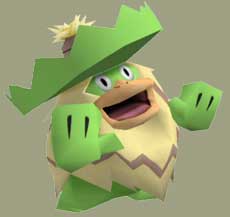
I met with a group of educators and we discussed creative ways to stimulate reading to teens, (this in addition to teaching under the oppressive No Child Left Behind System) One sugested using Pokemon or Yu-Gi-Oh cards might be a good idea another agreed, but the one teacher said it was a bad idea because many of the cards are inherently racist.
This 2000 article supports it, keep in mind that while this article is only about one stereotype the makers of Pokemon didn't forget African American Males or males of Latin descent. The truly sad thing about this balatant act of racism. Is that instead of preparing thier youth for a global society the Japanese government condones these actions thus poisoning thier own future from embracing the inevitable.
I confess: I succumbed to Pokémon fever. I took my 10-year-old son to "The Pokémon Movie" during opening weekend. I suffered through the bad animation and mindless plot while he sat spellbound as the battles advanced toward a saccharine moral. When I saw the movie, I already understood the phenomenon, having bought Pokémon Red, Blue, Yellow and Pinball. Manufactured by
 The fun merely begins with the game, however. Pokémon trading cards capitalize on the game's popularity. Despite my son's begging, I initially resisted investing in Pokémon cards, having bought Pogs and Beanie Babies when those fads were at their peak. So, without spending a dime, my son assembled a 60-some-card collection using duplicates donated by friends.
The fun merely begins with the game, however. Pokémon trading cards capitalize on the game's popularity. Despite my son's begging, I initially resisted investing in Pokémon cards, having bought Pogs and Beanie Babies when those fads were at their peak. So, without spending a dime, my son assembled a 60-some-card collection using duplicates donated by friends.  I eventually relented and allowed him to buy a starter set, theme deck and several booster packs of Pokemon cards at prices ranging from $4 to $17.
I eventually relented and allowed him to buy a starter set, theme deck and several booster packs of Pokemon cards at prices ranging from $4 to $17.
Like I said, I have submitted to Pokémania. And I would have paid a premium for the video game Pokémon Snap if only I could have found it on store shelves or e-commerce sites during the holiday shopping season. Unfortunately, Nintendo underestimated demand, and the most popular Pokémon toys were snatched up around Thanksgiving. Committed to resume my search for Pokémon Snap after the Christmas rush, I saw a character on the Pokémon TV cartoon that not only stripped the phenomenon of its innocence but stopped me cold.
Nintendo underestimated demand, and the most popular Pokémon toys were snatched up around Thanksgiving. Committed to resume my search for Pokémon Snap after the Christmas rush, I saw a character on the Pokémon TV cartoon that not only stripped the phenomenon of its innocence but stopped me cold.
The character Jynx, Pokémon #124, has decidedly human features: jet-black skin, huge pink lips, gaping eyes, a straight blonde mane and a full figure, complete with cleavage and wiggly hips. Put another way, Jynx resembles an overweight drag queen incarnation of Little Black Sambo, a racist stereotype from a children's book long ago purged from libraries.
While my 10- and 12-year olds do not find Jynx offensive, their parents and grandparents do. We call a spade a spade. And we have seen enough racist stereotypes to know one when we see it. There was room to debate whether "Star Wars: Episode One's" Jar Jar Binks was West Indian, but there is no question about this Pokémon character. Jynx clearly denigrates African Americans, particularly black women. At the close of the 20th century, how could Japanese computer animators unleash such a culturally insensitive menace on the global marketplace?
In Asia the racist stereotypes popular before World War II apparently die hard. In 1985 when Colgate-Palmolive bought Darkie Toothpaste from Hong Kong's Hazel & Hawley Chemical Co., the new owner inherited not only a leading brand but also a racist name and logo featuring a grinning caricature in blackface and a top hat. Rival Procter & Gamble leaked news of the offensive logo to the American market, sparking protests by civil rights groups. Though Colgate eventually scrapped the Al Jolson-inspired logo and changed the brandname to Darlie, the Cantonese name-Haak Yahn Nga Gou-remains "Black Man Toothpaste."
Every few years, the Japanese sense of superiority seems to resurface.
For example, the Japanese fought to keep U.S. military bases in Okinawa from relocating to the mainland. And about a decade ago, a high-ranking Japanese official attributed Japan's low crime rate to the country's lack of ethnic diversity, blaming African Americans for the high crime rate in the U.S.
These are strange days. Sisters in Harlem toss long tresses-courtesy of hair extensions shorn from women in Shanghai-to the beat of misogynistic raps produced by Japanese media giant Sony.
So I am not surprised, though I am appalled, that a computer animator at a Japanese corporation would conceive of Jynx and that corporate executives would deem the character appropriate for multiracial markets. Even Jynx's name-a variation on the term "jinx," which means a bearer of bad luck-has negative connotations. In addition, the name Jynx suggests a link with witch doctors and voodoo, practices rooted in African religion but often ridiculed by Western culture.
Pokémon is unquestionably the year's hottest toy. Since Pokémon's arrival in the U.S. in 1998, more than 7 million of the games have been sold, representing more than half of all U.S. video game revenues.
Will African-American parents continue to cough up hard-earned dollars for games and trading cards featuring a monstrously racist image? Will Jynx deal Pokémon's last hand in the black community? Or will the blonde-haired, black-faced, monster evolve into an ebony princess? Stay "tooned."
Carole Boston Weatherford, a High Point, N.C. poet and children's book author, wrote Sink or Swim: African-American Lifesavers of the Outer Banks
(Coastal Carolina Press, 1999).
No comments:
Post a Comment